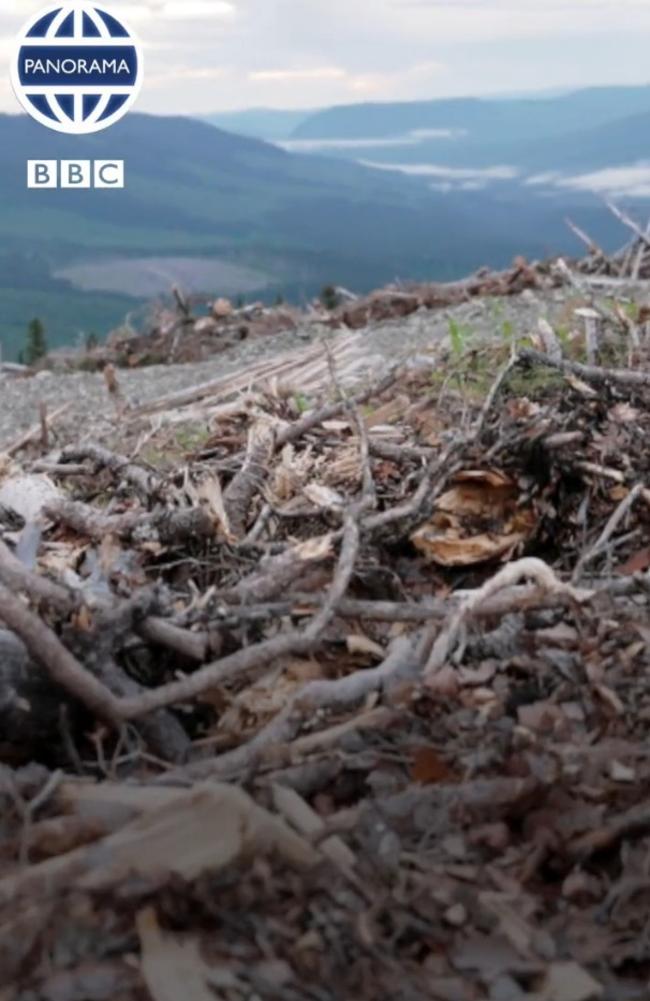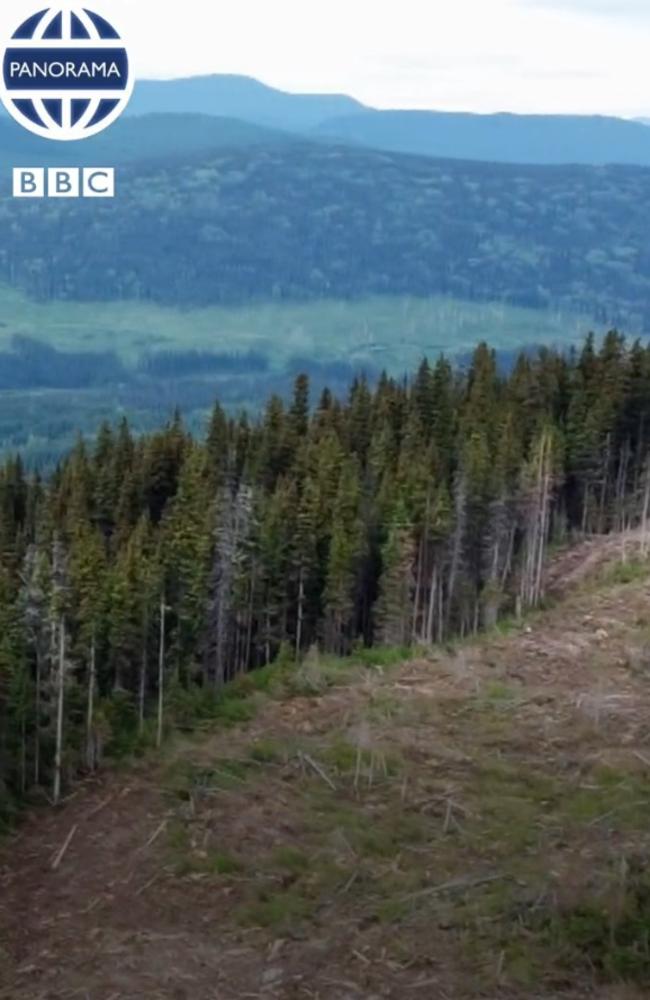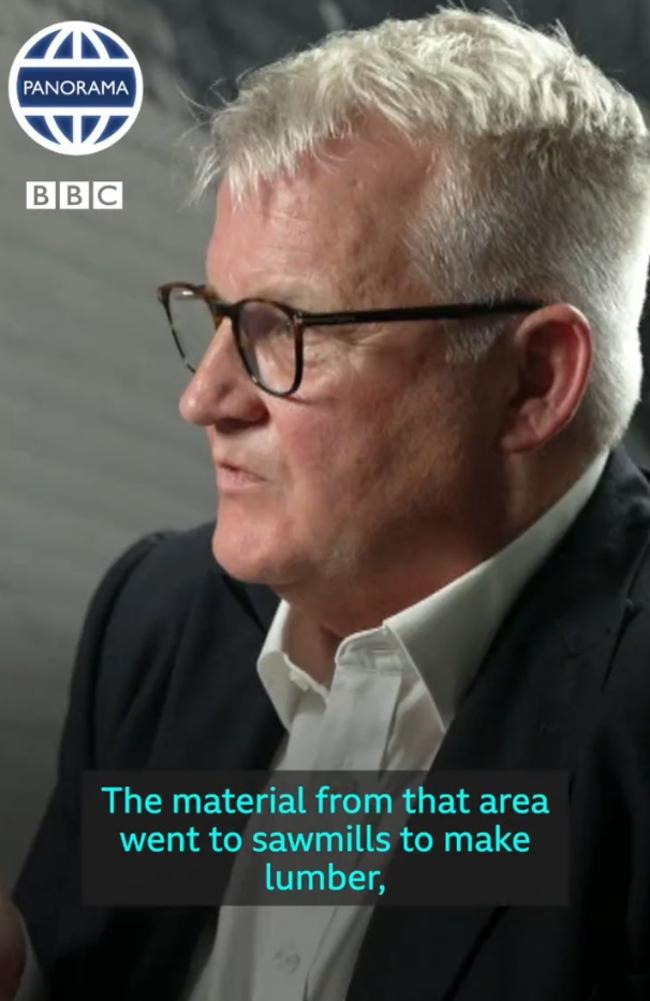‘Green’ energy firm cuts down old-growth forests to burn as wood chips
A major energy company which receives billions in “green” subsidies has been exposed for committing an “insane” act.
A major UK energy company which receives billions of pounds in “green” subsidies has been exposed cutting down old-growth Canadian forests for wood pellets to burn for electricity.
Millions of tonnes of wood pellets – a controversial energy source billed as “renewable” as trees can be replanted – have been replacing coal in Europe as countries seek to meet their climate change targets.
The rapidly growing biofuel industry was valued at $US50 billion annually in 2020, but environmentalists and even climate change campaigners led by Greta Thunberg have condemned the practice, urging the European Union to reverse its “discredited and harmful” directive that classifies forest biomass as zero-carbon.
Drax is chopping down trees and taking logs from some of the world’s most precious forests to burn at its Yorkshire power station, which provides 12% of the UK’s renewable energy
— BBC Panorama (@BBCPanorama) October 3, 2022
The Green Energy Scandal Exposed is on @BBCOne at 8pm and on @BBCiPlayerhttps://t.co/HLU6BawieApic.twitter.com/IL5foz4OfP
In a new investigation, the BBC’s Panorama program revealed this week that energy company Drax, which runs Britain’s largest power station, is cutting down environmentally important, primary forests in British Columbia.
“This area of primary forest, forest that was in development for thousands of years, is now gone, it’s been obliterated, and it’s deeply upsetting,” forestry campaigner Michelle Connolly told the program.
“Logging natural forests and converting them into pellets to be burned for electricity, that is absolutely insane, there’s no other word for it.”


The Drax power station in Yorkshire, a converted coal plant, now produces 12 per cent of the UK’s renewable energy and has received £6 billion ($10.6 billion) in taxpayer subsidies.
“It’s really a shame that British taxpayers are funding this destruction with their money,” Ms Connolly said.
The company claims it only uses sawdust and waste wood to make the pellets, but the Panorama team caught the firm red-handed transporting whole logs from the forest to its pellet plant.
Drax purchased logging licences to cut down two areas of rare, old-growth forests, which it denied were primary forest because they were near roads — but proximity to roads is not mentioned in the UN definition.
Satellite pictures show the entire area covered by one of the logging licences has already been cut down, with logging now underway in the second area.
Panorama reporter Joe Crowley confronted Drax spokesman Alan Knight over the practice.
“Our business model is based on using the materials other companies like the sawmill sector cannot use,” Mr Knight said.
“Where we have those logging licences, that same rule applies. The important thing is we didn’t use that material. The material from that area went to sawmills to make lumber. We took the sawdust which we would have done anywhere else in the world, and in that particular case because of the distances involved, we didn’t take the slash.”
Slash is the material Drax typically says it uses to make pellets.
“It seems like a lie,” Ms Connolly said.
“Yeah, I think we’re being lied to. It’s left these piles of waste behind when the claim of the pellet industry is that only waste and residuals, or mostly waste and residuals, is going towards the creation of pellets. Clearly that’s not true.”


In a statement on Monday, Drax said the Panorama program had made a series of “one-sided” and “inaccurate claims” and that the company was considering legal action.
“Canada has some of the most highly regulated forests in the world which ensures the forests in British Columbia are managed properly and provide positive benefits to nature, the climate and people,” it said.
“People living in and around these forests are best placed to determine how they should be looked after, not the BBC. Drax’s own world-leading sustainable sourcing policies are aligned with the rigorous regulatory frameworks and rules set by both the BC and UK governments.”
Drax cited the UN’s IPCC, the world’s “leading science-based climate authority”, which recently restated the “critical role that biomass will play in meeting global climate targets when sourced sustainably”.
“Biomass is used by countries around the world to provide reliable renewable energy, whatever the weather, which displaces fossil fuels like coal from energy systems, supporting climate targets,” it said.
Drax said the BBC had “focused primarily on the views of a vocal minority who oppose biomass” and that the program makers had “sought to repeat the inaccurate claims about biomass which have for years been promoted by those who are ill-informed about the science behind sustainable forestry and climate change and those who have vested interests in seeing the biomass industry fail”.
“As anyone in the BC forestry industry knows, the forests there are not harvested for biomass, they are harvested for high value timber used in construction,” it said.
“Eighty per cent of the material used to make our pellets at Drax in Canada is sawmill residues – sawdust, wood chips and bark left over when the timber is processed. The rest is waste material collected from the forests which would otherwise be burned to reduce the risk of wildfires and disease.”
It comes as the UK government prepares to publish a new biomass strategy later this year setting out its policy for fuels including wood pellets.






